19 Nov 2019 - {{hitsCtrl.values.hits}}
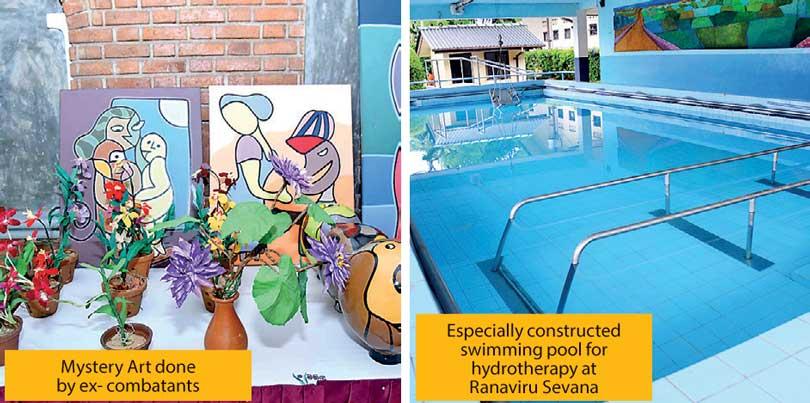

 The bloodied past of the thirty-year long conflict keeps reflecting in their memories. Having lived the greater part of their lives on battlefields, engaging in what were termed as ‘humanitarian operations’ against deafening noises emanating from blasting mortars, claymore bombs and the frequent gunshots, the physical and psychological trauma were part and parcel of their lives.While many of them succumbed to injuries, another section of this generation who require special assistance to do their day-to-day work are being well looked after. Although many of them initially sought treatment at Ranaviru Sevana based in Ragama, at present those who require further rehabilitative care are stationed at Mihindu Seth Medura in Attidiya.
The bloodied past of the thirty-year long conflict keeps reflecting in their memories. Having lived the greater part of their lives on battlefields, engaging in what were termed as ‘humanitarian operations’ against deafening noises emanating from blasting mortars, claymore bombs and the frequent gunshots, the physical and psychological trauma were part and parcel of their lives.While many of them succumbed to injuries, another section of this generation who require special assistance to do their day-to-day work are being well looked after. Although many of them initially sought treatment at Ranaviru Sevana based in Ragama, at present those who require further rehabilitative care are stationed at Mihindu Seth Medura in Attidiya.
A walk around Mihindu Seth Medura
Mihindu Seth Medura(MSM) is home to 42 war heroes; some who are recovering and a few who are bed-ridden and require the assistance of a caretaker. Spanning an area of 35 acres, the Healing Centre is located amidst a serene environment in the heart of Attidiya. Several facilities are also in place, including a swimming pool to ensure a maximum healing experience for the wounded heroes.
The walls of MSM are adorned with Mystery Paintings or Mayachitra, a form of art therapy conducted on the ex-combatants where they breathe in and out while scribbling. Then they tilt the drawing boards and erase excess lines until they get a desired shape.
During a recent visit to MSM the Daily Mirror spoke to a few ex-combatants, who shared their personal stories with us.
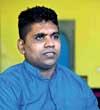
When I saw that my friends were injured we were determined to end the war. Apart from the bloodshed we had fun as well
Pushpakumara
“Stop paving the way for another war”
“When I was sent to the MavilAru operation I had a fear,” recalled Authorized Officer Pushpakumara of 11th Gemunu Seva Regiment. “When I saw that my friends were injured we were determined to end the war. Apart from the bloodshed we had fun as well. In Mullaitivu we had to take control over a lake bund and I fell victim to a claymore bomb in 2008. I’m still recovering, but we are well taken care of. The staff tries to keep us mentally fit. A country doesn’t need a war, but people are trying to create conflicts. We urge these groups to stop paving the way for another war.”
“War destroys everything”
Sergeant Ranjith Karunathilake from Randenigala has served in the 9th Sinha Regiment. “After O/Ls I joined the Army in 1998. I got caught to a blast in Jaffna and was unconscious for three years. I was partially paralyzed as well. I do physiotherapy, but it’s difficult to do other work. The war destroys everything and no country needs a war.
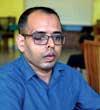
After O/Ls I joined the Army in 1998. I got caught to a blast in Jaffna and was unconscious for three years
Ranjith Karunathilaka
“We sacrificed our youth to save the country”
In Lance Corporal Thilak Kumara’s case it was a friend who had suggested that he should join the Army. Hailing from Neluwa, Galle he joined the Army back in 2008. “My friend helped me with the documentation and thereafter I became an officer. I was injured in 2009. After 16 days I regained consciousness. By 2010 I was recovering, but because there’s water accumulating in the brain I used to tilt my head. Now I’ve recovered. I used to learn computer. A war puts an end to the future generations. There have been instances when those who shared the same lunch were shot dead the next instance they went to wash their hands. It’s difficult to bear all the trauma. We sacrificed our youth to save the country.”
Having fallen victim to mortar and claymore attacks, many of them are recovering. They find it difficult to remember past events due to head injuries. Some are given speech therapy and much is being done to strengthen their psychological wellbeing.
“They still have a soldier’s discipline in their blood” : Lt. Col. Karunaratne
They are being re-skilled and Lt. Colonel Upendra Karunaratne believes it to be a challenge. “Many of them are unaware of the fact that time has progressed since they got injured. Some are in a vegetative state, running on machines. Some have lost eyesight and hearing and can only recognise another person through touch. Many of them are single and rather than the physical pain, their unseen psychological trauma is beyond description. So when we talk and work with them we have to make sure that they don’t get hurt. With all these injuries they still have a soldier’s discipline in their blood.”
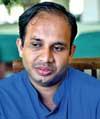
There have been instances when those who shared the same lunch were shot dead the next instance they went to wash their hands
Thilak Kumara
“They have lived in pain ever since” : Major Lekamge
For Major Dr. Anurudhdha Lekamge, Head of the medical wing at Mihindu Seth Medura pain management itself is a challenge.Having graduated from Peradeniya University, he had joined the Army in 2007 as per the requirement. Major Lekamge has experience attending to casualties even on the battlefield. “We need to concentrate on each individual. We have to identify their special needs which could be medical or non medical. They have an immediate contact with me. Their immediate resource is the bystander and for that we get untrained personnel and train them.They have lived in pain ever since the war concluded. For some it has become part of their lives, some have accepted it and some are fighting it. Therefore, behavioural therapy and psychological support are important. They are in their limits to be controlled by drugs. For this we are doing routine investigations by sending them for scans, checking multi organ functions whether they are deteriorating etc. Therefore pain management itself is a challenge. They don’t have fresh injuries and as such we need to have a multidisciplinary support. We also go in for medical interventions as well. Dietary requirements also differ from case to case. For some their bowel habits have changed, others have diabetes, high blood pressure etc. We get advice from dietitians at the Army hospital and decide on the menus,” said Dr.Lekamge.
A visit to Ranaviru Sevana
Established in 1990, Ranaviru Sevana based in Ragama was the main rehabilitation centre of the Sri Lanka Army prior to constructing Mihindu Seth Medura in 2011. Apart from the wards for residential soldiers seeking treatment, it also includes a gymnasium, swimming pool, therapy units and a prosthetics workshop as well.
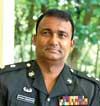
Many of them are unaware of the fact that time has progressed since they got injured. Some are in a vegetative state, running on machines
Lt. Colonel Upendra Karunaratne
“The main challenge is to get them motivated” : Col. Chandrasiri
Speaking to the Daily Mirror, Colonel Wipula Chandrasiri, Deputy Commandant at Ranaviru Sevana said that 10 years after the war Ranaviru Sevana also accepts non-combat casualties too. “We have three categories ; those directly involved during combat, serving soldiers who have met with accidents while performing duties and those who are on leave. There’s a fourth category which includes those who have been retired, but paralyzed and seek special attention. After a soldier retires we give free medical attention at the Army hospital in Narahenpita or in Polonnaruwa, Diyatalawa, Kandy and Anuradhapura. When they need a rehabilitation programme they refer those casualties for residential treatment. Those who have been rehabilitated to the maximum are sent to Abimansala or to Mihindu Seth Medura rehabilitation centres. So far we haven’t sent any non-combat casualties to Mihindu Seth Medura or Abimansala 1,2 or 3. We want to have a separate place for the non-combat casualties. There are doctors, nurses and other assistant staff totaling up to 280 to look after 120 odd patients. One person has to be looked after by three people. We manufacture prosthetics at the workshop here. All equipments are made in-house. We face all challenges positively. We have a directorate of rehabilitation and when the soldiers are medically fit we put them for re-skilling programmes. Even after retirement they will be able to do their own work. The main challenge is to get them motivated,” said Col.Chandrasiri.
While at Ranaviru Sevana we spoke to a few ex-combatants who were decorated.
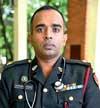
some have accepted it and some are fighting it. Therefore, behavioural therapy and psychological support are important
Major Dr. Anurudhdha Lekamge
No country needs another war
Bestowed with Purnabhumi and Deshaputhra medals Corporal Dassanayake of the 11th Sri Lanka Infantry Regiment joined the Army in 2006.“I got injured in Pawalpindi. My father was in the Army and that motivated me to join this force. I’m from Gampola. During my leisure time I play chess. I feel that no country needs a war,” said Dassanayake.
“I joined the Army against my mother’s wishes”
M. Nuwan Dharshana Kumara from Kegalle was serving as a Corporal at the 1stVijayaba Infantry Regiment. “I joined the Army in 2004 against my mother’s wishes. But later she was alright. I got injured in 2009 in Puthukudiriyippu. I couldn’t walk when I came here, but now I can. I’m married and have three children. We don’t want another situation like that again,” said Kumara.

I couldn’t walk when I came here, but now I can. I’m married and have three children. We don’t want another situation like that again
Nuwan Dharshana Kumara
“Doctors thought I would never recover”
“I joined the Army because I liked to wear the uniform,” said Major Shehan Perera. “Therefore I joined the force in 2004. Then I went for training and in 2006 I had the first posting in Muthur. As soon as I went there I was sent to fight in the Kattaparichchan attack.
But I didn’t have any prior experience. Since we were in the fighting battalion, we were put into one battle after another. During the Thoppigala operation I got caught to a mortar blast. After I got injured I went back to fight and got reinstated in the same place and I still remember where I got injured. It was near the Madu Church. I received the Ranawickrama medal for fighting at that operation.
I haven’t been at a rehabilitation centre before. I suffered many injuries and doctors never thought I would recover,” said Major. Perera.
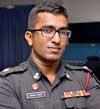
During the Thoppigala operation I got caught to a mortar blast. After I got injured I went back to fight and got reinstated in the same place
Major Shehan
“I got injured on the day the war ended”
“When I was shot, my son was only 10 months old,” recalled Staff Sergeant Dinesh at the 2nd Special Task Force. “I’m from Hatton. I always wanted to join the Army. I joined in 2002 and after the training at the Puttalam Vijayaba Infantry Regiment I joined the Special Forces. I got injured in Nandikadal on the day the war ended. My neck was injured and was eventually paralyzed. I had been in the ICU for 21 days and later at the Army hospital for a year.
I don’t remember what happened. In 2012 I came to Ranaviru Sevana and for two years I had to be assisted. Now I can hold an aid and walk. I play badminton as well.
Now my son is 11 years old. Only those who have fought a war will understand its gruesomeness. I have friends in different ethnicities. We wanted to put an end to terrorism. There are many of us who are disabled today. Many wives lost their husbands and many children lost their fathers.”
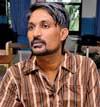
My neck was injured and was eventually paralyzed. I had been in the ICU for 21 days and later at the Army hospital for a year
Staff Sergeant Dinesh

Serene environment at Mihindu seth medura
28 Nov 2024 7 hours ago
28 Nov 2024 8 hours ago
28 Nov 2024 9 hours ago
28 Nov 2024 28 Nov 2024
28 Nov 2024 28 Nov 2024